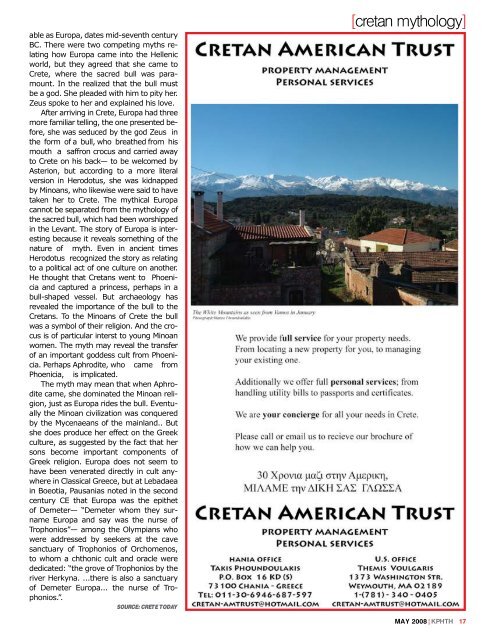THE BATTLE OF CRETE THE BATTLE OF CRETE - Pancretan ...
THE BATTLE OF CRETE THE BATTLE OF CRETE - Pancretan ...
THE BATTLE OF CRETE THE BATTLE OF CRETE - Pancretan ...
You also want an ePaper? Increase the reach of your titles
YUMPU automatically turns print PDFs into web optimized ePapers that Google loves.
able as Europa, dates mid-seventh century<br />
BC. There were two competing myths relating<br />
how Europa came into the Hellenic<br />
world, but they agreed that she came to<br />
Crete, where the sacred bull was paramount.<br />
In the realized that the bull must<br />
be a god. She pleaded with him to pity her.<br />
Zeus spoke to her and explained his love.<br />
After arriving in Crete, Europa had three<br />
more familiar telling, the one presented before,<br />
she was seduced by the god Zeus in<br />
the form of a bull, who breathed from his<br />
mouth a saffron crocus and carried away<br />
to Crete on his back— to be welcomed by<br />
Asterion, but according to a more literal<br />
version in Herodotus, she was kidnapped<br />
by Minoans, who likewise were said to have<br />
taken her to Crete. The mythical Europa<br />
cannot be separated from the mythology of<br />
the sacred bull, which had been worshipped<br />
in the Levant. The story of Europa is interesting<br />
because it reveals something of the<br />
nature of myth. Even in ancient times<br />
Herodotus recognized the story as relating<br />
to a political act of one culture on another.<br />
He thought that Cretans went to Phoenicia<br />
and captured a princess, perhaps in a<br />
bull-shaped vessel. But archaeology has<br />
revealed the importance of the bull to the<br />
Cretans. To the Minoans of Crete the bull<br />
was a symbol of their religion. And the crocus<br />
is of particular interst to young Minoan<br />
women. The myth may reveal the transfer<br />
of an important goddess cult from Phoenicia.<br />
Perhaps Aphrodite, who came from<br />
Phoenicia, is implicated.<br />
The myth may mean that when Aphrodite<br />
came, she dominated the Minoan religion,<br />
just as Europa rides the bull. Eventually<br />
the Minoan civilization was conquered<br />
by the Mycenaeans of the mainland.. But<br />
she does produce her effect on the Greek<br />
culture, as suggested by the fact that her<br />
sons become important components of<br />
Greek religion. Europa does not seem to<br />
have been venerated directly in cult anywhere<br />
in Classical Greece, but at Lebadaea<br />
in Boeotia, Pausanias noted in the second<br />
century CE that Europa was the epithet<br />
of Demeter— “Demeter whom they surname<br />
Europa and say was the nurse of<br />
Trophonios”— among the Olympians who<br />
were addressed by seekers at the cave<br />
sanctuary of Trophonios of Orchomenos,<br />
to whom a chthonic cult and oracle were<br />
dedicated: “the grove of Trophonios by the<br />
river Herkyna. ...there is also a sanctuary<br />
of Demeter Europa... the nurse of Trophonios.”.<br />
SOURCE: <strong>CRETE</strong> TODAY<br />
[cretan mythology]<br />
MAY 2008 | KPHTH<br />
17




